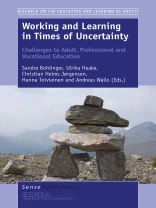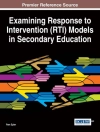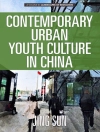‘This book analyses the challenges of globalisation and uncertainty impacting on working and learning at individual, organisational and societal levels. Each of the contributions addresses two overall questions: How is working and learning affected by uncertainty and globalisation? And, in what ways do individuals, organisations, political actors and education systems respond to these challenges?
Part 1 focuses on the micro level of working and learning for understanding the learning processes from an individual point of view by reflecting on learners’ needs and situations at work and in school-work transitions. Part 2 addresses the meso level by discussing sector-specific and organisational approaches to working and learning in times of uncertainty. The chapters represent a broad range of branches including public services (police work), the automotive sector and the health sector (elderly care). Finally, Part 3 addresses the macro level of working and learning by analysing how to govern, structure and organise vocational, professional and adult education at the boundaries of work, education and policy making.’
Jadual kandungan
The European Society for Research on the Education of Adults (ESREA); Introduction: Working and Learning in Times of Uncertainty; Micro Level of Working and Learning; Configurations of Learning in Global Work; Work and Learner Identity: Developing an Analytical Framework; Key Predictors of Learning Transfer in Continuing Vocational Training: Development of a Theoretical Framework and Testing of an Empirical Model with Structure Equation Modelling (SEM); Knowledge Development in Internship: A Case-study of Students’ Access to Tacit and Explicit Knowledge in Blended Learning (BL) Programmes; Leadership in Times of Globalisation and Uncertainty; Meso Level of Working and Learning; Police Students’ Values of Competence Related to a Professional Career; Police Leadership Practice in Times of Uncertainty and Organisational Turmoil; Dilemmas in Automation Engineers’ Daily Work and the Changing Form of Learning; Employee Resourcing in Elderly Care: Attracting, Recruiting and Retaining the Right Competence; Recognition of Prior Learning within Elderly Care Work; Macro Level of Working and Learning; Challenges for Work-Based Learning in Vocational Education and Training in the Nordic Countries; Vocational Education and School to Work Transitions in Norway; Training for Innovation in Spain: Analysis of Its Effectiveness from the Perspective of Transfer of Training; Vocational Education and Training from the Perspective of Key Informants of Employer Associations in Spain: A Qualitative Analysis; Governing Vocational Education and Training in Europe; Conclusion: The Contested Field of Working and Learning; List of Contributors.












